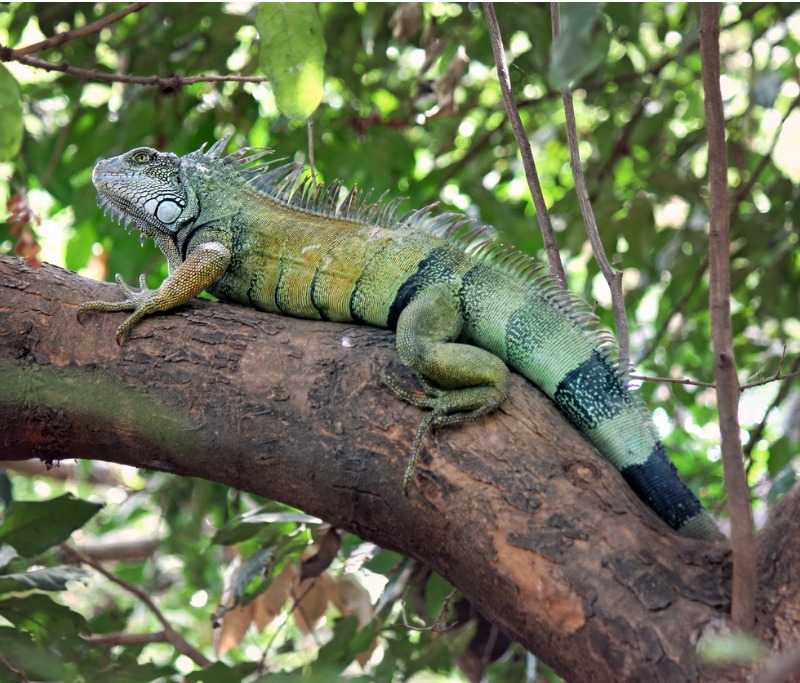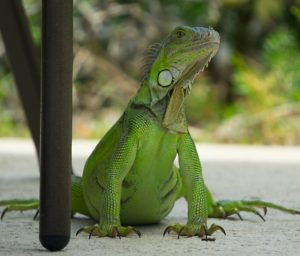
06 Sep Iguanas Are Harmless to Humans but May Eat Your Plants; and Plants Iguanas Don’t Eat
The Invasive Green Iguana (and Plants Iguanas Don’t Eat)
The green iguana is an invasive species in South Florida. However, many remain unaware that these reptiles are not native to the state. Unfortunately, their presence often results in damage to our flower plants and greenery in our yards.
It remains quite common for South Florida homeowners to see a green iguana dining on an excellent breakfast of their favorite flowers or plants on the property. Nevertheless, it is important to remember that these invaders remain living creatures. The question is, what can South Floridians do to repel the animals from their yards safely and humanely? Here is how to deter iguanas.
Our team from Frank’s Lawn & Tree Service wants to break down some information on our favorite varieties of natural iguana repellent, and how they can affect reader lawn care. Read on to learn more!
Keeping Iguanas Out of Our Gardens with Natural Iguana Repellent
The majority of iguanas that we see in South Florida were once domesticated pets. What this means is that they likely either escaped, or their owners released them. The problem is that as an invasive species, these plant-eating lizards will devour almost anything in a lawn or garden.
Iguanas also enjoy digging burrows that damage grass, and even walkways. They might also leave feces behind that remains unsightly, smelly, and represents a significant health hazard in the form of salmonella.
Just because a former iguana owner carelessly discarded their previous pet doesn’t make it okay to pick up or touch the reptiles. A good majority of South Florida iguanas may be feral. This means they may prove dangerous if they feel threatened.
The best natural iguana repellent is keeping them from invading a lawn or garden in the first place. This may mean transforming the environment to one that it is not so iguana friendly.
Some of our favorite natural iguana repellent ideas include:
- Filling in iguana burrows that you may discover on the property. It is best to fill in these areas during the day when the iguanas will not call the burrow home.
- Getting rid of areas where green iguanas like to hide. This might include brushy areas, as well as low-growing plants or shrubs, and branches or stone piles.
- Not leaving scraps of food around like fresh fruits or vegetables. Open compost bins can also represent a problem that invites iguanas into the yard.
Transforming your yard or garden to make it friendlier to iguana predators is also a great natural way to help repel the invaders. Owls, hawks, and crows all serve as enemies to the iguanas.
Some homeowners with dogs may also notice that their pets might bark or chase the iguanas. In some cases, this will drive iguanas from the property. However, more giant iguanas can hurt pets, so this doesn’t represent an ideal solution.
Low fences around a lawn or garden may also keep iguanas out. Nonetheless, it is vital to take precautions on trees and shrubs, affixing metal collars around their trunks to prevent iguanas from climbing up to eat flowers and fruit.
Information on Natural Iguana Repellent from Frank’s Lawn & Tree Service
 If your yard suffers abuse from freeloading iguanas, it is never too soon to act. These tormentors remain content to invade and eat virtually everything on your property before taking a nice sunbathe on the roof of your lanai.
If your yard suffers abuse from freeloading iguanas, it is never too soon to act. These tormentors remain content to invade and eat virtually everything on your property before taking a nice sunbathe on the roof of your lanai.
To learn more about some of the steps you can take to administer natural iguana repellent and transform your yard into an unfriendly iguana habitat, contact Frank’s Lawn & Tree Service today!

